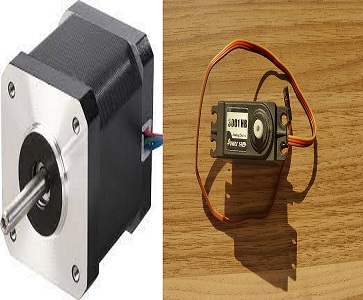Posted on 21st Dec 2022

Nowadays it is difficult to pick the best motor for an application in the industrial marketplace. The information available on websites is either very simple or technical. A stepper motor refers to a type of brushless DC motor, which is designed to offer a definite number of definite steps per revolution. Based on the number of pulses received, the stepper motor will move in the forward or reverse direction, every time it is pulsed by the stepper controller.
Pros of Stepper motors
A stepper motor can provide open-loop positioning, one of the biggest advantages as compared to open-loop induction motors, which don't offer "positioning". There is no feedback involved in most of the stepper motors and that's the reason for the lower overall cost of a stepper and control solution.
Also, the stepper motor can be operated with a DC-powered stepper drive which is advantageous for industrial applications. There is no need for larger inverters, which input 230/460VAC or bulky fusing, and cabling as well.
Limits of stepper motors
Stepper motors can ‘lose’ position if it does not offer sufficient torque to move the shaft and load. It can even occur at high speeds where the stepper motor goes very rapidly to lock in at each step.
Steppers do not keep any kind of known positioning when they are powered down. Thus, they have to finish a homing routine each time they are powered up. You can experience this while turning on your printer at home. In brief, stepper motors are perfect for some industries and small power applications that range from adjustable conveyors, 3D printers, and small metering pumps.
What is a servo motor?
While servomotors refer to a motor, which is controlled with feedback. These motors include a stator like an induction motor, but their rotors are made with unusual earth magnets. This cuts down the slip present in induction motors and permits the servo motor to operate at the synchronous speed set by the frequency and number of poles.
Pros of servomotors
AC servo motors use rare earth permanent magnets, so they offer the best-in-class torque density. This is preferred for very dynamic motor applications that must accelerate and decelerate quickly. Servo motors include some sort of feedback, whether it is a resolver or encoder. The shaft feedback is critical because it is used in the servo controller to control rotor position and torque.
Unlike a stepper motor, servomotors can offer momentary peak torque across their speed range. Peak torque of servo motor can be highly significant in particular applications and can cause an optimized motor selection. Also, AC servo motors run at much quicker speeds as compared to stepper motors.
Crucial motion control applications, which include functional safety and the handling of vital or pricey products must utilize servo motors with feedback. The low price advantage of a stepper motor/control can't justify the danger of injury or product breakdown. In packaging machines, robotics, material handling, servo motors are highly used.
Limits of servo motors
The main cons of servo motors as compared to stepper motors is the cost of the motor and the connected drive, which controls it. This is mainly factual for smaller power applications. If there is no need for precision and high torque overload in an application that the servo motor provides, then a stepper motor is possibly the good choice.
Servomotors are best for some industries and applications such as forming machines, packaging machines, powering conveyor systems, metal cutting, and robotics.
Stepper Motor Repair and Servo Motors Repair
CM Industry Supply Automation offers complete Stepper Motor Repair and Servo Motor Repair from a machine tool or an assembly operation.
We have a specialist servo repair department that offers in-house servo motor repairs from different manufacturers such as Lenze, KEB, Siemens, ABB, Allen Bradley, Indramat, Kollmorgen, Rockwell, Mitsubishi, Bosch, Elau, and more.
Contact us now for more details.